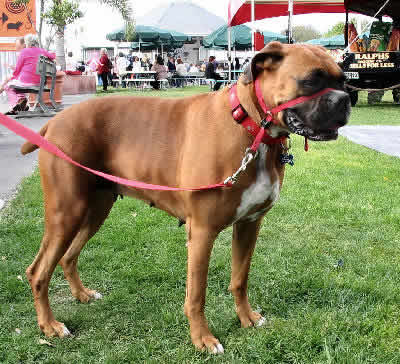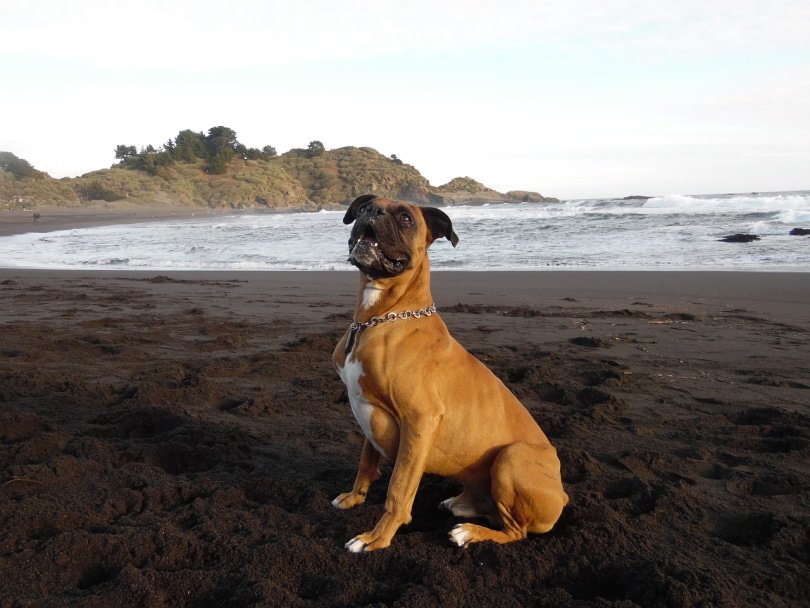
The Boxer has a compact athletic build, and although you can keep it in an apartment, it enjoys an active lifestyle and needs excercise everyday.
Boxers are playful and energetic, and they make good companions for owners who are active. They are loyal and get along with almost everyone if properly socialized. When choosing a boxer, look out for thyroid problems, hip dysplasia, and a family history of cancer and heart conditions.
- Kingdom: Animalia
- Phylum: Chordata
- Class: Mammalia
- Order: Carnivora
- Family: Canidae
- Genus: Canis
- Species: lupus familiaris
Common Name(s)
Boxer, German Boxer, Deutscher Boxer
Breed Type
The Boxer is a working breed that was once used for hunting and bull baiting. Today, the Boxer is prized as a pet and guard dog. This breed is best suited to moderate climates.
Background
Boxers are descendants of the Bullenbeisser, a distinct type of Mastiff, and Bulldogs. The breed was developed in the late 1800s in Germany, and was quickly introduced to other parts of Europe and the United States. Popular hybrids include the Boxerdoodle (Boxer and Poodle mix) and the Golden Boxer (Boxer and Golden Retriever mix).
Description
Boxers have a compact, athletic build. Colors include fawn, brindle, and red, all with white markings. Predominantly white boxers are also common, but some kennel clubs will not register them. They have a protruding lower jaw, with folds of skin running from the root of the nose down the sides of the muzzle. The eyes are dark, the nose black, and the ears large and pointed. Ear cropping is optional, and tail docking is standard where permitted. Males are 22-25 inches tall and weigh 60-70 pounds. Females are 21-24 inches tall and weigh 53-65 pounds.
Care and Feeding
A Boxer’s diet should include pork, poultry, oats and rye. It is best to feed two or three small meals each day to prevent bloat. Certain foods may cause allergic reactions in some dogs.
Regular brushing is all that is needed to maintain your Boxer’s coat. Baths should be given only when necessary. This breed tends to keep itself clean. The Boxer’s tail should be docked at 1 to 3 days of age. If the ears are to be cropped, it should be done in the same time frame.
Annual checkups are very important for this breed. Vaccinations are administered as follows:
- 6-8 weeks: Distemper, Leptospirosis, Hepatitis, Parainfluenza, Parvo, and Corona virus (DHLPPC)
- 10-12 weeks: Second DHLPPC
- 14-16 weeks: Third DHLPPC and rabies
- Annually: DHLPPC and rabies booster
Boxers are very clean dogs, but they shed moderately. If kept inside, regular vacuuming is important.
Housing Your Dog
Boxers can live in an apartment if they get enough exercise. It is best if they have a yard to play in. Extreme temperatures should be avoided.
Social Behaviors
Boxers get along well with children, and if properly socialized they usually get along with fellow dogs and other pets. Females tend to fight with other female boxers, and occasionally with females of other breeds.
Handling and Training
Boxers are smart and eager to learn, but they can also be rather stubborn. They respond well to positive reinforcement. Housebreaking is usually easy due to the breed’s dedication to cleanliness.
Activities
Boxers are very active, and they need a walk and additional exercise each day. They enjoy playing fetch, and they relish the opportunity to run free.
Breeding/Reproduction
When choosing a mate for your boxer, there are several genetic health problems that you should be aware of. Check bloodlines for cancer, heart conditions, thyroid problems, hip dysplasia, and epilepsy.
Common Health Problems
Bloat is a major concern with Boxers. Small meals and properly timed exercise can help prevent it, but it is important to keep the vet’s emergency number on hand just in case. Allergies can be a problem, so you may have to avoid giving your Boxer certain foods or exposing him to certain chemicals and other allergens.
Availability
Boxers are easy to find in most areas due to their popularity. Prices are usually $600 to $800.
References
“Boxer“, Dog Breed Info Center, Copyright 1998-2008
Cusick, William D., “What to Feed a Boxer“, Referenced online, 2008
“Boxer (dog)“, Wikipedia, Copyright 2008
“Boxer Puppies for Sale“, Copyright PuppyFind.com, LLC, Referenced online, 2008
Featured Image Credit: Marco-willy, Pixabay
